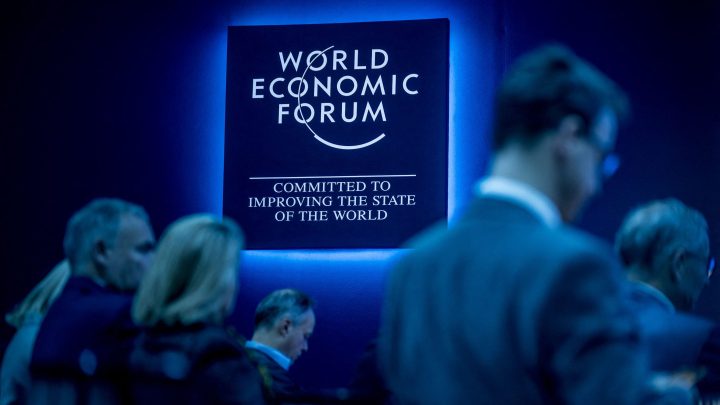
What are some of the key takeaways from Davos 2024?

The World Economic Forum in Davos, Switzerland, and will wrap up Friday. At this exclusive and costly annual meetup, politicians, business leaders and economists discuss some of the world’s most pressing challenges.
Patrick Foulis, foreign editor at The Economist magazine, was in Davos and spoke with Marketplace’s Sabri Ben-Achour about some of the key topics of discussion, including artificial intelligence and elections, as well as some of the overarching themes at this year’s conference.
“Overhanging all of that,” Foulis said, “is the sense of the world order changing — the tensions between America and China, the rise of more powerful, middle-power-type countries around the world, and the sense that the old world in which America was the preeminent power is passing now into something more complicated.”
The following is an edited transcript of their conversation.
Sabri Ben-Achour: So last year, you were on the program, you spoke with David Brancaccio about the 2023 Davos Conference and the hot topics then were global inflation, climate change, globalization. What are the hot topics this year?
Patrick Foulis: One thing has changed a lot from last year, which is the talk of recession has receded. So inflation is coming down globally. Many people think the Federal Reserve will be cutting interest rates over the next year or so. Another thing that’s changed is the technological obsession at Davos is different. So everyone now is talking about AI, and in the previous years, there’s been Big Data, the metaverse, crypto — so almost every year there’s a new fad. But you know, overhanging all of that is the sense of the world order changing — the tensions between America and China, the rise of more powerful, middle-power-type countries around the world, and the sense that the old world in which America was the preeminent power is passing now into something more complicated.
Ben-Achour: This happens every year. People with big titles talk about big ideas, goals, challenges. I just wonder, if we look back, what are some actual policies or solutions or consensuses that have actually come out of Davos and made some kind of important change in the world?
Foulis: Really, the thing going on here behind the scenes is thousands and thousands of bilateral meetings between different companies, different political leaders and companies, and that’s really what the main use of Davos is. And what’s the outcome of that? Well, the honest answer is thousands of decisions that aren’t necessarily that connected. I think what you can do is take a step back and try and draw out some common themes, but I think it’s a mistake to see Davos as having a sort of collective purpose and mission. It’s not really how it works.
Ben-Achour: Well, with that in mind, what are your big takeaways?
Foulis: I mean, I would say there are sort of two or three things. First is that companies are beginning to adapt to this unruly new world order. And when you talk to businesses, whether they’re in semiconductors, energy, finance, they’re all doing deals that reflect this new situation. So, for example, big semiconductor companies building new factories in America or in Europe, something they would never have done 10 years ago. The other thing that’s going on, I think, is the diplomacy is just much more difficult, and there’s a real sense that all these crises now popping up are very, very problematic to solve. That’s true in their own right.
But the third thing — and it’s really hanging over everything here in a way — is the prospect of the Trump victory. Already, many, many decisions are beginning to be made that weigh a possibility. And you can see that most obviously with Ukraine, where there’s a real feeling that if Trump won, Ukraine might be abandoned by America. From our meetings at The Economist with world leaders who we’ve met and companies, there’s a lot of Plan B scenarios going on where people try and work out what a Trump presidency would mean, not just for America but for the world economy.
There’s a lot happening in the world. Through it all, Marketplace is here for you.
You rely on Marketplace to break down the world’s events and tell you how it affects you in a fact-based, approachable way. We rely on your financial support to keep making that possible.
Your donation today powers the independent journalism that you rely on. For just $5/month, you can help sustain Marketplace so we can keep reporting on the things that matter to you.

















